- Home
- Diana Palmer
Wyoming Heart Page 26
Wyoming Heart Read online
Page 26
Mina was surprised to see him. She’d actually had Cousin Rogan invite her father to the event, so delighted with her new life that she was no longer holding the vicious grudge that had occupied her most of her old life.
Cousin Rogan smiled as she joined him while Cort held the baby and showed him off to Cash and Garon and Parker, his brothers.
“What is it?” her cousin asked.
“Fender’s here,” she replied. “I thought he was going to stay in Catelow to look after the ranch with Bill McAllister. And where’s my father? I said you could invite him, but he didn’t show up.”
Cousin Rogan looked guilty. “Well, actually, Mina, your father’s here.”
She blinked. She looked around at the crowd, but she didn’t see a single person that she didn’t know. “Where?”
He took her by the shoulders and turned her slowly toward Fender, who was standing behind her, looking worried and apprehensive.
“There, Mina,” Rogan replied.
Mina stared at Fender and images flashed in her mind. He was always watching out for her, checking to make sure she got home safely at night, taking an interest in who she dated. He had a big dog that he loved. Her father had loved dogs.
Her face paled.
“I’m sorry,” Fender said quietly. “You didn’t want to see me when Rogan first told you, and I had to try. So I signed on to work on the ranch.” He drew in a long breath. “I tried so damned hard to get custody of you. I really wanted you with me. Your mother was too eaten up with spite and hatred to let me near you. I just...gave up. I was afraid she’d make up a story and have me put in prison. But not a day went by when I didn’t love you or want to get you away from her. I tried several times over the years, through lawyers, to get custody. I failed every damned time.”
“Why did she hate me so?” she asked miserably.
“Because you weren’t hers,” he said flatly.
She gasped. “What?”
“When we first got married, we found out that she couldn’t have a child. I’d been briefly engaged to another woman and she’d gotten pregnant. She was dying and begged me to take you. I did, against your mother’s wishes. She hated me for it, hated you, hated the world.”
“So that was why,” Mina said heavily.
“That was why. You’re my daughter. But you’re not your mother’s daughter. The woman who gave birth to you was a kind, sweet woman who was frail and undemanding. Your mother was flamboyant and seductive and I fell head over heels for her. It was a flash in the pan. I paid for it, your real mother paid for it and you paid for it. One mistake, and you and I are still paying for it.”
Mina felt a weight lift from her heart. She finally understood. “I’m sorry,” she began.
“I’m the one who should be apologizing,” he interrupted her. “It was my fault. All of it. I left your mother for another flash in the pan, although I didn’t regret it except for losing you. The woman you thought was your mother was a greedy, cold, hateful woman, who poisoned every life she touched. She said she’d make sure I never got custody of you, no matter what lies she had to tell.” He swallowed. “If you want to fire me, I’ll understand. I didn’t come here to ruin your special day.”
She just stared at her father. She didn’t know what to say. “I wish I’d known sooner,” she said finally.
He shrugged. “You know now. That’s enough. I’d like to get to know you all over again,” he added. “I’m so proud of you.”
She managed a weak smile. “I’d like that, too.”
He nodded. He smiled. “So I’ve still got a job?”
“You bet.”
“Then I’ll get back to Catelow and do it.”
She nodded. “You can write me. I’ll write back.”
“I’ll do that. Thanks,” he added huskily. “For giving me a second chance.”
“Thanks for clearing up the mystery. No wonder she hated me. I was ashamed that I could never love her. Now I’m not ashamed anymore.”
“No reason to be. She wasn’t a lovable woman.” He hesitated. “Well, I’ll see you around, Mina.”
She laughed. “I’ll see you around. Dad.”
He flushed. Then he beamed. “I’ll work on earning that title.” He shook hands with Rogan and smiled one more time at Mina before he turned away and had one of the ranch cowboys drive him to the airport, where Rogan’s private jet was waiting to return him to Catelow.
“I think things are looking up,” Rogan told her.
She agreed, smiling. “They are, indeed. Thanks,” she added.
He shrugged. “My pleasure.”
“Did you know that he was applying for the job at my ranch?” she added.
“No. That was his own idea. But if I’d known, I wouldn’t have stopped him. He loves you, you know. He’s carrying enough guilt of his own.”
“I’ll write to him. Things will work out. They just need a little time,” she said.
He grinned. “They do.” He glanced over at Cort. “I like your husband.”
“I think he’s amazing,” she returned.
“I did notice,” he drawled.
She laughed. Her eyes met her husband’s across the distance that separated them. He looked back at her and smiled, too.
In that long, sweet look was a meeting of hearts as enduring as the land on which Latigo stood. Cort cuddled their firstborn close and started toward Mina through the crowd of family and friends. She met him halfway.
“Happy?” he asked her in a deep, soft tone.
“So happy that I can barely hold it all inside,” she replied breathlessly. Her hand touched their son’s soft tuft of black hair. “We have the whole world, don’t we, Cort?” she asked.
“The whole world, and then some,” he agreed.
She looked up into his eyes and sighed as she considered what a long road she’d traveled to get to this shared delight.
I’d do it all over again, she thought suddenly. I’d go through every miserable bad day of my life, just for this.
Just for Cort’s soft eyes looking down into hers with love, as he held their son in his arms.
* * *
Clancey Lang vows to never let another man into her heart...until she falls for her boss, Texas Ranger Colter Banks. And for Banks, there’s something about Clancey he just can’t resist...
Keep reading on for a sneak preview of Unleashed, part of the Long, Tall Texans series from New York Times bestselling author Diana Palmer.
Unleashed
by Diana Palmer
CHAPTER ONE
“EVEN A DOCTOR couldn’t read this handwriting,” Clancey muttered to herself as she tried to decrypt a note jotted in the margin of a photocopied arrest record.
“What are you muttering about now?” Colter Banks asked from the doorway.
Colter was her boss, a Texas Ranger who worked cold cases for the San Antonio office of the Department of Public Safety. He was gorgeous: tall, narrow hipped, with powerful long legs and broad shoulders. He had dark brown hair and liquid black eyes. Those eyes were glaring at her.
She looked up with a disgusted expression on her oval face. She brushed away a strand of dark, wavy hair from her forehead. Pale gray eyes glared at him. “I can’t read this.” She waved the sheet at him.
“If you’d like to resign...?” he offered, and looked hopeful.
“I can’t resign. This was the only job available and I have to eat,” she grumbled.
He took the sheet from her and frowned as he studied the note he’d placed next to a certain charge on the rap sheet.
“Ha!” she exclaimed.
He glanced at her. “What do you mean, ha?”
“You can’t read it, either, can you?” she accused.
He lifted his chin. “Of course I can read it,” he scoffed. “I wrote it.”
/> “So, what does it say?”
He stared at it again. He had to puzzle it out or she was never going to let him forget this. While he stared at the scribble and tried to make sense of it, the phone rang.
He tossed the sheet back on her desk. “Phone.”
“Excuse,” she said under her breath.
He glared at her as he pulled his cell phone out of its holder. “Banks,” he said.
He listened. His face grew harder. He glanced at Clancey, who was still waving the sheet at him, and turned his back. “Yes, I can do that,” he replied. “Sure. I’ll stop by on my way home. No problem. See you.”
He put his phone back and looked pointedly at his watch. “I’ve got to see the assistant DA on a case I’m working, that Reed case from five years ago. We hear that Morris Duffy, who was suspected in his disappearance, may be getting out of prison a year early for good behavior, and soon,” he remarked, missing the sudden worried expression on his assistant’s face. “We could sure use a break in the case.” He glanced again at his watch. “I’d better go on. Almost quitting time.”
Clancey got her composure back before his eyes fell on her face. “You still haven’t translated this for me,” she said pointedly, indicating the sheet.
He glared at her.
“Well, it’s not my fault you can’t write,” she said belligerently. “I’ll bet the teacher who tried to teach you cursive threw confetti on the last day of school and walked you all the way to the school bus.”
He glared harder. “I can write cursive just fine, thank you.”
“Then what does it say?” she persisted.
“I’ll take it under advisement and get back to you,” he said nonchalantly.
“You can’t read it,” she said, and grinned.
“I could read it if I wanted to,” he retorted.
“How am I supposed to type up this report if I don’t know what you’ve written?” she asked reasonably.
“If they question me about it, I’ll tell them you had a senior moment,” he said with a deadpan expression.
“I’m twenty-five, not eighty!” she huffed.
“I thought you were twenty-four.”
“I was, until last November, just after I came to work for you,” she said. “Birthdays come once a year. You don’t stay the same age forever.”
He didn’t react to the snarky comment. He slid his white Stetson over one eye. “If anyone calls, I’ll be out until tomorrow.”
“If they call, they’ll call you, not me,” she pointed out.
“You have the fixed phone, that antique thing that’s attached to the wall,” he pointed out.
“I have a cell phone,” she said defensively.
“Does it have anything except numbers on it?” he asked with a sarcastic smile.
She glared at him. “I’m going to get a really fancy smart phone as soon as I pay off my new yacht,” she said belligerently.
He turned away before she saw the smile. “Okay, nasturtium. Have a good night.”
“I am not a nasturtium!”
“A likely story,” he muttered on his way out. “I’ll bet my badge you don’t even know what a nasturtium is.”
“I do so!” she called after him.
When he was out of sight, she pulled the pocket dictionary out of her drawer and looked it up.
It was a flower. Well! Maybe he didn’t dislike her as much as he seemed to. She wondered at the irony, because the meaning of her real name was the same as that of the nickname he’d stuck her with. She doubted if he’d paid any attention to her name on the job application. It had been, after all, the department’s interviewer who’d hired her for this job.
She glanced at the sheet she still couldn’t read and put it in her desk drawer. Tomorrow, she promised herself, she’d pin him down and make him take a crack at it.
Meantime, she typed up the reports she could read.
* * *
SHE WORRIED ABOUT the cold case Banks was working on. He didn’t know, and she wouldn’t tell him, but the victim had been her grandfather, Dalton Reed. She didn’t want to share any of her private life with her bulldozer of a boss. Even in prison, her stepbrother, Morris Duffy, could have things done to her, or worse, to her little brother, Tad. He’d even threatened that when he went away. Keep your mouth shut, he’d said. Things could happen to the boy, even if he was in prison. He had friends. The threat was still enough to keep her silent.
She’d always suspected her stepbrother, Morris, of killing her grandfather, but the body had never been found. If there was a body. She grimaced. Her grandfather had always been punctual. If he said he’d be there at six, he’d be there at five forty-five. He would never have just gone away from his job and his family without telling anyone. Unless he was dead.
Dalton Reed was a former sheriff’s deputy. Even after retirement, he’d been a volunteer deputy. He could make a guitar sing. Clancey still had his precious guitar. She’d hidden it while Morris lived at home, for fear that he’d sell it. After all, he’d made frequent allusions to its value. He’d also been covetous of her grandfather’s antique Colt .45 in its equally antique hand-tooled holster. Odd thing, the gun and gun belt had vanished along with her grandfather. She’d thought at first that Morris might have sold them. But they were collectibles, and a lot of people in San Antonio—including many policemen and sheriff’s deputies, knew about them. Perhaps Morris had been too cautious to put them on the market.
Clancey had loved her grandfather. He was the only good in her miserable home life. Her stepfather, Ben, had coddled Morris, his son from a previous marriage, as if he’d invented bread. He protected the boy, got him out of trouble all the time, refused to believe his own son had ever done anything bad. Tad had never gotten the attention from Ben that Morris had. The child got his affection from his half sister, Clancey, who’d loved him from the day he was born. After the death of her mother, Diane, not long after Tad’s birth, Clancey and her grandfather had been Tad’s protectors, until her grandfather’s disappearance.
Tad had only been three at the time when her grandfather didn’t come home. But a few days before that, Morris had viciously attacked Tad for crying during his video game. The little boy was screaming as Morris slapped him around. When Clancey had come running at the sound of the child’s screams, she saw Morris, cursing, grab up a metal scoop that was used in the open fireplace. As she yelled, horrified, he swung it at the child and knocked him off the couch. Clancey ran to defend the little boy, and Morris swung the heavy scoop at her, breaking two ribs and bruising her as he swung it over and over again.
It had been a brutal act that still kindled nightmares. She’d had bruises and cuts on her face and arms, in addition to the broken ribs, and her back had suffered a torn muscle. There was a worse complication that sent her to the emergency room. Ben had come home from work just after the incident. He grimaced at Clancey’s condition and reluctantly called an ambulance, recognizing that her injuries might be life threatening. She begged Ben to let Tad go, too, but Ben refused. The kid would be all right, he said sarcastically. He was just bruised. Morris had told him, drugged up and wild-eyed, that the child and Clancey had been tussling and both fell off the sofa. Ben believed him.
Clancey was horrified at what had happened and sick with fear for little Tad. One of those vicious blows had caught the little boy in the head and he was bawling. She didn’t want to tell the truth, out of fear of what her stepbrother might do, but the doctor on call at the emergency room quickly realized that she was a victim of a brutal assault. He dragged the truth out of her. She told him she was afraid for her baby brother, who’d also been a victim of the attack. The doctor had called the police.
Clancey hadn’t wanted to cause trouble. The policeman, a veteran, did. He drove Clancey to her home after she was treated, questioning her about the incident. He insisted on seeing
Tad, who was obviously injured. He said the child would need medical attention and called for an ambulance. Then he promptly arrested Morris, who was staggering and screaming curses at everyone, even a shaken Ben. Half the neighborhood came outdoors when they heard him yelling. Ben had pleaded with Clancey to tell the police Morris didn’t do it, but to no avail. She explained to him that Morris had attacked Tad for interrupting his video game, then he’d beaten her up when she tried to save her little brother.
Ben said Morris would never hurt a child—those bruises were from falling when he’d been playing with Clancey. The policeman said that it was odd that the bruises on the child were shaped like the metal shovel from a fireplace set, wasn’t it? He added that Clancey’s broken ribs were hardly from a fall while playing. He sent Morris off in another squad car and went into the house to question everybody who lived there. Clancey was intimidated by Ben and said as little as possible, but her grandfather was a gold mine of information on Morris’s recent behavior. He added that he thought the boy was on drugs and that he was selling them as well, to afford his expensive video console and the games to go with it. That provoked a violent reply from Ben. The policeman had calmed them both down and continued taking notes. The ambulance arrived then, and Ben climbed in with Tad, already complaining about the expense of it.
The kind policeman had told Clancey it would be all right. They’d lock up Morris and he wouldn’t be a threat to her or Tad again.
She wrote out her version of what had happened and signed it. So did her grandfather. Ben would be required to do the same, later. Her grandfather took her prescriptions to the pharmacy and paid for them out of his own pocket. They both knew that Ben wouldn’t spend a penny on her. She’d turned on Morris.
But Morris was permitted bail while he awaited his trial, which they said could take months. Ben tried to mortgage the house to afford a fancy lawyer for his son, only to be reminded that Dalton Reed was co-owner of the property and until he could be found or declared dead, Ben had no right to sell it. He blamed Clancey for that as well, and he paid no more attention to Tad than was necessary. They’d kept the little boy overnight, to observe him after the mild concussion. Clancey had stayed with him. Her boss, who was then the lieutenant of detectives at a precinct close to Clancey’s home, Cal Hollister, had gone to the hospital to sit with her. He was one of the kindest men she’d ever known, although she had no romantic feelings for him. A widower, he kept to himself and had nothing to do with women. But he liked Clancey. He was furious about what Morris had done and promised that he was going to speak to Darrell Tarley, the assistant district attorney on the case, and make sure Morris didn’t weasel out of the very serious charges. The fact that Morris had used a weapon in the assaults made it a second-class felony, which carried a penalty, if convicted, that would put Morris away for several years. Clancey felt guilty for hoping the justice system would remove the frightening man from her life, and Tad’s.

 A Cattleman's Honor
A Cattleman's Honor For Now and Forever
For Now and Forever Texas Proud and Circle of Gold
Texas Proud and Circle of Gold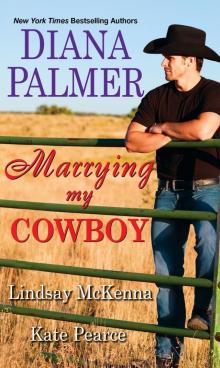 Marrying My Cowboy
Marrying My Cowboy Wyoming Heart
Wyoming Heart Christmas Kisses with My Cowboy
Christmas Kisses with My Cowboy Wyoming True
Wyoming True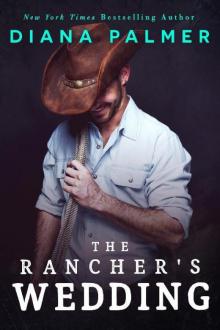 The Rancher's Wedding
The Rancher's Wedding Mercenary's Woman ; Outlawed!
Mercenary's Woman ; Outlawed! Long, Tall Texans: Stanton ; Long, Tall Texans: Garon
Long, Tall Texans: Stanton ; Long, Tall Texans: Garon Lawless
Lawless Blake
Blake Escapade
Escapade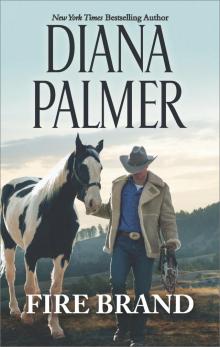 Fire Brand
Fire Brand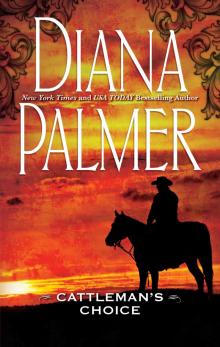 Cattleman's Choice
Cattleman's Choice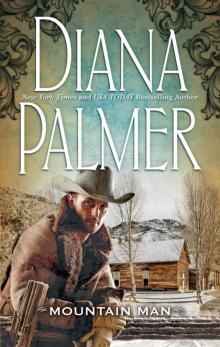 Mountain Man
Mountain Man Long, Tall and Tempted
Long, Tall and Tempted A Love Like This
A Love Like This Miss Greenhorn
Miss Greenhorn Magnolia
Magnolia Lord of the Desert
Lord of the Desert Wyoming Fierce
Wyoming Fierce True Colors
True Colors Calamity Mom
Calamity Mom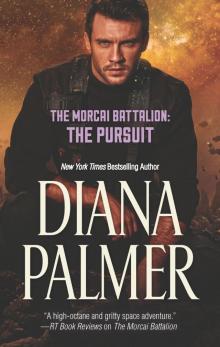 The Pursuit
The Pursuit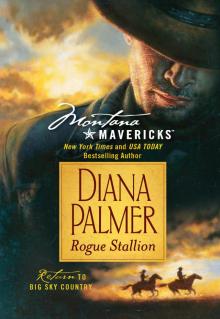 Rogue Stallion
Rogue Stallion Date with a Cowboy
Date with a Cowboy Heart of Winter
Heart of Winter Friends and Lovers
Friends and Lovers Love on Trial
Love on Trial Boss Man
Boss Man Callaghan's Bride
Callaghan's Bride Before Sunrise
Before Sunrise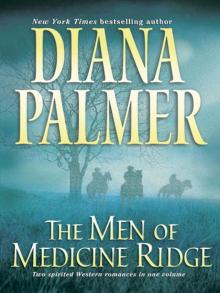 The Men of Medicine Ridge
The Men of Medicine Ridge Texas Proud
Texas Proud Wyoming Tough
Wyoming Tough Passion Flower
Passion Flower Maggie's Dad
Maggie's Dad Donavan
Donavan The Rancher & Heart of Stone
The Rancher & Heart of Stone Long, Tall Texans: Tom
Long, Tall Texans: Tom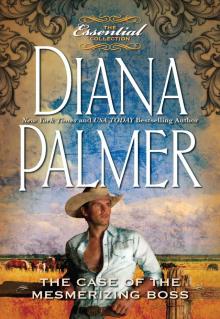 The Case of the Mesmerizing Boss
The Case of the Mesmerizing Boss Montana Mavericks Weddings
Montana Mavericks Weddings Redbird
Redbird Wyoming Strong
Wyoming Strong Darling Enemy
Darling Enemy Love by Proxy
Love by Proxy Coltrain's Proposal
Coltrain's Proposal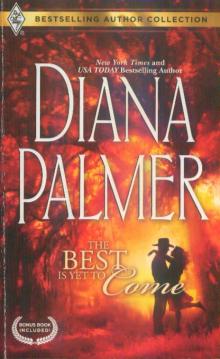 The Best Is Yet to Come & Maternity Bride
The Best Is Yet to Come & Maternity Bride Rawhide and Lace
Rawhide and Lace Wyoming Rugged
Wyoming Rugged Patient Nurse
Patient Nurse Undaunted
Undaunted Long Tall Texans Series Book 13 - Redbird
Long Tall Texans Series Book 13 - Redbird Outsider
Outsider Long, Tall Texans: Drew
Long, Tall Texans: Drew Long, Tall Texans--Christopher
Long, Tall Texans--Christopher Merciless
Merciless A Match Made Under the Mistletoe
A Match Made Under the Mistletoe Evan
Evan Hunter
Hunter Now and Forever
Now and Forever Hard to Handle
Hard to Handle Amelia
Amelia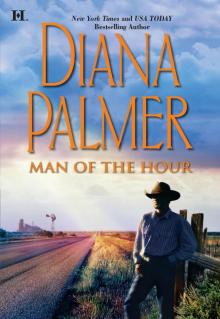 Man of the Hour
Man of the Hour Invincible
Invincible The Maverick
The Maverick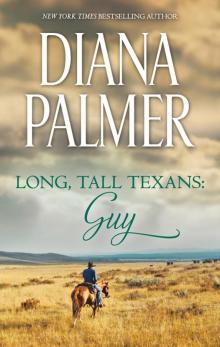 Long, Tall Texans--Guy
Long, Tall Texans--Guy Noelle
Noelle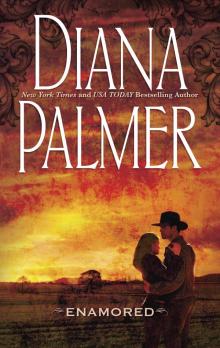 Enamored
Enamored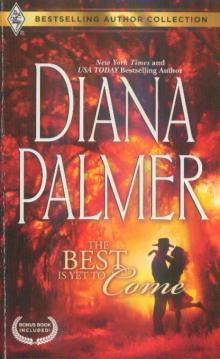 The Best Is Yet to Come
The Best Is Yet to Come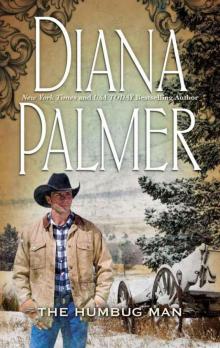 The Humbug Man
The Humbug Man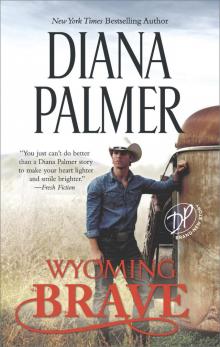 Wyoming Brave
Wyoming Brave Calhoun
Calhoun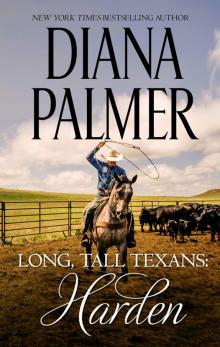 Long, Tall Texans--Harden
Long, Tall Texans--Harden The Reluctant Father
The Reluctant Father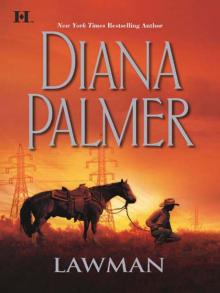 Lawman
Lawman Long, Tall Texans: Hank & Ultimate Cowboy ; Long, Tall Texans: Hank
Long, Tall Texans: Hank & Ultimate Cowboy ; Long, Tall Texans: Hank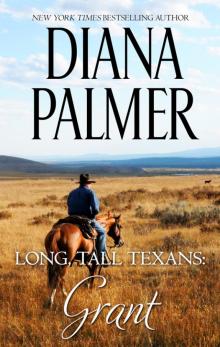 Grant
Grant Nelson's Brand
Nelson's Brand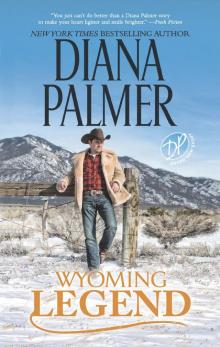 Wyoming Legend
Wyoming Legend Diamond Spur
Diamond Spur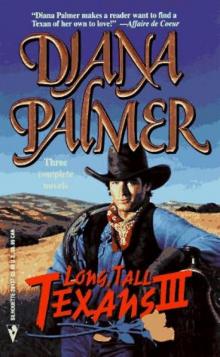 That Burke Man
That Burke Man Wyoming Bold (Mills & Boon M&B)
Wyoming Bold (Mills & Boon M&B) Heartless
Heartless Long, Tall Texans--Luke
Long, Tall Texans--Luke To Have and to Hold
To Have and to Hold Once in Paris
Once in Paris A Husband for Christmas: Snow KissesLionhearted
A Husband for Christmas: Snow KissesLionhearted Night Fever
Night Fever Beloved
Beloved The Australian
The Australian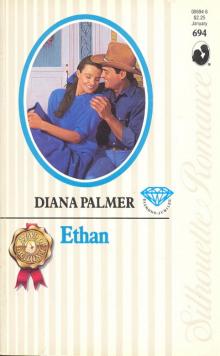 Ethan
Ethan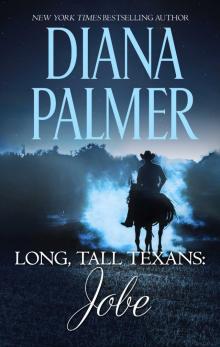 Long, Tall Texans: Jobe
Long, Tall Texans: Jobe Bound by Honor: Mercenary's WomanThe Winter Soldier
Bound by Honor: Mercenary's WomanThe Winter Soldier Tender Stranger
Tender Stranger After Midnight
After Midnight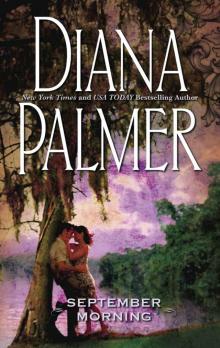 September Morning
September Morning To Wear His Ring
To Wear His Ring Heartbreaker
Heartbreaker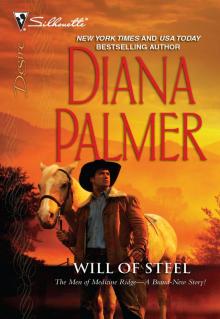 Will of Steel
Will of Steel Dangerous
Dangerous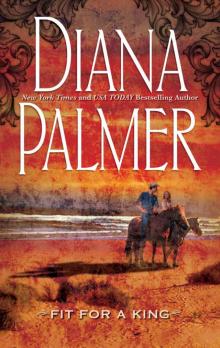 Fit for a King
Fit for a King Diamond in the Rough
Diamond in the Rough Matt Caldwell: Texas Tycoon
Matt Caldwell: Texas Tycoon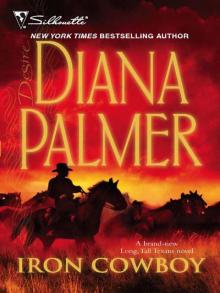 Iron Cowboy
Iron Cowboy Fire And Ice
Fire And Ice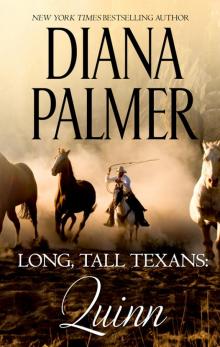 Long, Tall Texans--Quinn--A Single Dad Western Romance
Long, Tall Texans--Quinn--A Single Dad Western Romance Montana Mavericks, Books 1-4
Montana Mavericks, Books 1-4 Denim and Lace
Denim and Lace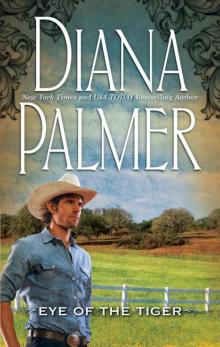 Eye of the Tiger
Eye of the Tiger The Princess Bride
The Princess Bride Long, Tall Texans: Rey ; Long, Tall Texans: Curtis ; A Man of Means ; Garden Cop
Long, Tall Texans: Rey ; Long, Tall Texans: Curtis ; A Man of Means ; Garden Cop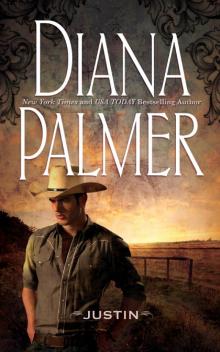 Justin
Justin Nora
Nora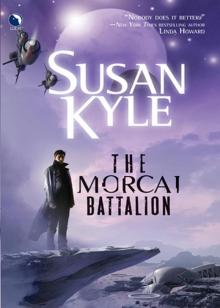 The Morcai Battalion
The Morcai Battalion Heart of Stone
Heart of Stone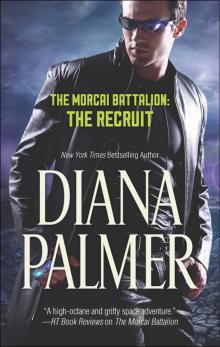 The Morcai Battalion: The Recruit
The Morcai Battalion: The Recruit To Love and Cherish
To Love and Cherish Invictus
Invictus Regan's Pride
Regan's Pride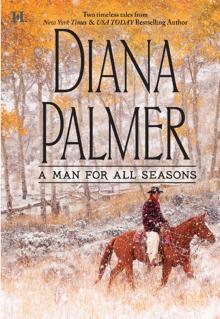 A Man for All Seasons
A Man for All Seasons Sweet Enemy
Sweet Enemy Desperado
Desperado Lacy
Lacy The Winter Man
The Winter Man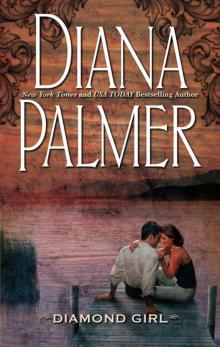 Diamond Girl
Diamond Girl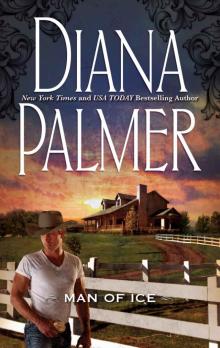 Man of Ice
Man of Ice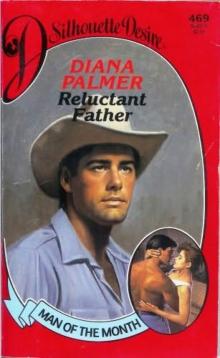 Reluctant Father
Reluctant Father Christmas with My Cowboy
Christmas with My Cowboy Love with a Long, Tall Texan
Love with a Long, Tall Texan Wyoming Bold wm-3
Wyoming Bold wm-3 King's Ransom
King's Ransom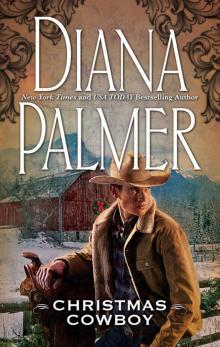 Christmas Cowboy
Christmas Cowboy Heart of Ice
Heart of Ice Fearless
Fearless Long, Tall Texans_Hank
Long, Tall Texans_Hank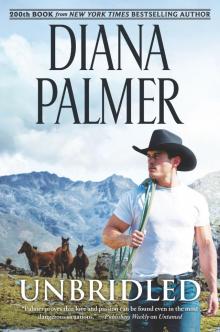 Unbridled
Unbridled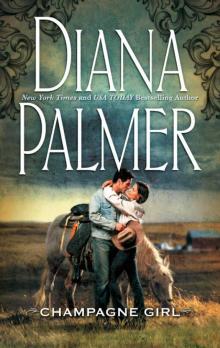 Champagne Girl
Champagne Girl The Greatest Gift
The Greatest Gift Storm Over the Lake
Storm Over the Lake Sutton's Way
Sutton's Way Lionhearted
Lionhearted Renegade
Renegade Betrayed by Love
Betrayed by Love Dream's End
Dream's End All That Glitters
All That Glitters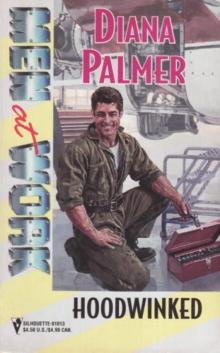 Hoodwinked
Hoodwinked Soldier of Fortune
Soldier of Fortune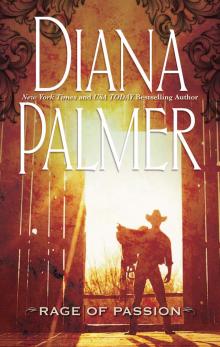 Rage of Passion
Rage of Passion Winter Roses
Winter Roses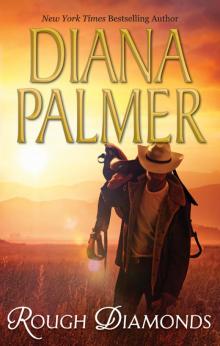 Rough Diamonds: Wyoming ToughDiamond in the Rough
Rough Diamonds: Wyoming ToughDiamond in the Rough Protector
Protector Emmett
Emmett True Blue
True Blue The Tender Stranger
The Tender Stranger Lone Star Winter
Lone Star Winter Man in Control
Man in Control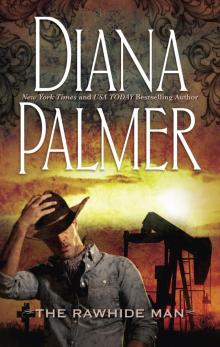 The Rawhide Man
The Rawhide Man Untamed
Untamed Midnight Rider
Midnight Rider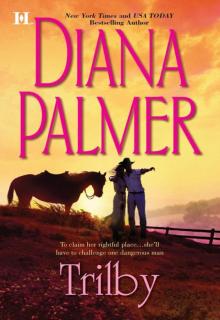 Trilby
Trilby A Long Tall Texan Summer
A Long Tall Texan Summer Tangled Destinies
Tangled Destinies LovePlay
LovePlay Blind Promises
Blind Promises Carrera's Bride
Carrera's Bride Calamity Mum
Calamity Mum Long, Tall Texan Legacy
Long, Tall Texan Legacy Bound by Honor
Bound by Honor Wyoming Winter--A Small-Town Christmas Romance
Wyoming Winter--A Small-Town Christmas Romance Mystery Man
Mystery Man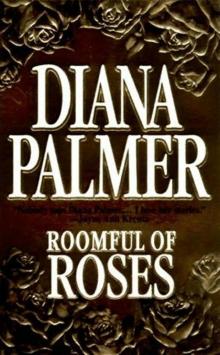 Roomful of Roses
Roomful of Roses Defender
Defender Bound by a Promise
Bound by a Promise Paper Rose
Paper Rose If Winter Comes
If Winter Comes Circle of Gold
Circle of Gold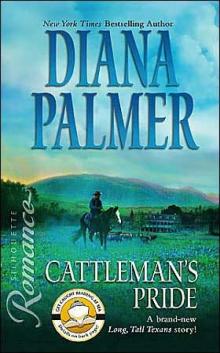 Cattleman's Pride
Cattleman's Pride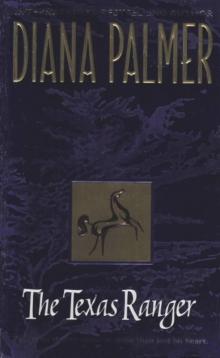 The Texas Ranger
The Texas Ranger Lady Love
Lady Love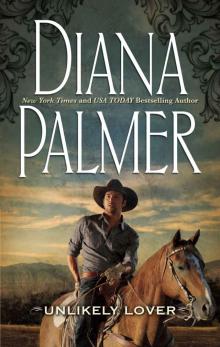 Unlikely Lover
Unlikely Lover A Man of Means
A Man of Means The Snow Man
The Snow Man The Case of the Missing Secretary
The Case of the Missing Secretary Harden
Harden Tough to Tame
Tough to Tame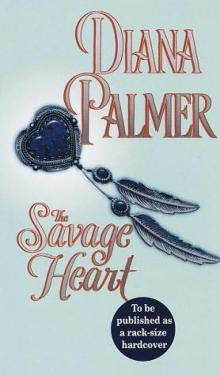 The Savage Heart
The Savage Heart